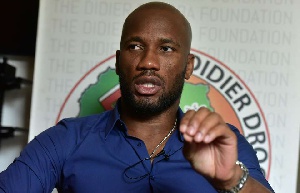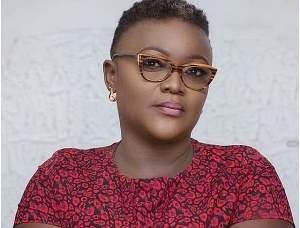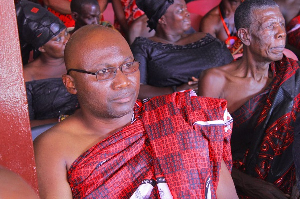- Home - News
- TWI News | TV
- Polls
- Year In Review
- News Archive
- Crime & Punishment
- Politics
- Regional
- Editorial
- Health
- Ghanaians Abroad
- Tabloid
- Africa
- Religion
- Election 2020
- Coronavirus
- News Videos | TV
- Photo Archives
- News Headlines
- Press Release
Opinions of Tuesday, 17 July 2007
Columnist: Tawiah, Benjamin
English On Ghanaweb Is Appalling: Says Akwasi Broni
When ace musician Kwadwo Daasebre Dwamena was acquitted and discharged by the Isleworth Crown court in London, I did a feature on drug trafficking in Ghana, in which I bemoaned the ‘Vice Ressein’ nature of the comments readers on the Ghanaweb forum post on news stories and features. My concern was that the forum has a reasonable representation of non-Ghanaian readers at any time, so it matters what we write, and how we write what we write. The foreigners, who for various reasons patronize the forum, make judgments on life in Ghana based on what they read: the tribal mudslinging and the shameful personal invectives. Is that all they do back home? They are wont to ask.
It may not be an exact case of show me your friend and I will tell you your character, but methinks it is a clear case of charity begins at home. And in our case, we only succeed in carrying Christian charity too far if we think that there is any ‘charity’ back home. In fact, you have to be charitable to think that we have the faintest understanding of the concept, judging from the way things are panning out.
Recently, I received a mail from an Akwasi Broni of an American after my feature on the university ratings had been published on the forum. I usually receive several-criticisms, insults and commendations-from Ghanaians, Nigerians and some Europeans. And, I am happy to declare that I met my wife on this forum. She had merely commented on something I had said, and we found reason to make a matrimonial sense out of that very usual comment. So, I take comments and emails from readers very seriously.
I took the American University professor’s mail even more seriously, because he had expressed grave concern about the standard of English we write on Ghanaweb. He did not intend to belittle us or criticize unnecessarily; he made the remark in a very well- intentioned manner, advising us to be mindful of the syntax and other important aspects of English grammar. He wrote that there are times the poor English we write obstruct his understanding of the subject we are discussing: ‘‘Usually I have to read a sentence two or three times to make sense out of what the writer is saying. The standard is generally low, I am sorry to say, Ben, and you are not an exception.’’
Before I would read the Oyibo’s mail, I had read another from a Ghanaian postgraduate student in Scotland, who was so happy about what I had discussed that he was eager to send me his dissertation for proofreading. Months before, and this is no attempt at self-aggrandizement at all, a reader who claimed he doesn’t speak good English, had described me as ‘‘the living martyr of contemporary literature.’’ If Noam Chomsky or John Seely, The Independent newspaper’s most trusted grammarian in Great Britain had seen this comment, I would today be serving a prison term for literary armed-robbery. I receive this insult almost daily: ‘‘Mr. Tawiah, you write like a rapist; you don’t respect the rules of grammar. What kind of a bogus journalist are you?’’ The latter is true, but the former is false. I haven’t raped any woman before; I was a virgin when I married this year at thirty-three.
The American professor, who said he has taught many Ghanaians and also has Ghanaian professors on his academic board, was not very ruthless in his observation, even though I had expected him to at least commend some of the good writers on the forum. Can a whole community of writers be as bad as the city of Sodom and Gomorrah in the Old Testament? I had the same difficulty that Lot, Abraham’s kinsman, had when he tried to assemble a handful of righteous people from the sodomy of Sodom. So, when I wrote to the American professor, to attempt a defense of our Ghanaian English, I wondered whether all the talk we have been doing is really much ado about nothing. All the same, I managed to tell the professor that I also noticed a few grammatical errors in his mail. Immediately, he wrote back that he is not surprised, because he usually asks his colleagues to proofread his essays. Well, we have become friends now, because he went about the criticism very politely. I must hasten to add that I got frightened when he wrote back to me that he would be attending an international conference to give a talk on a very academic-sounding topic in anthropology. There, I regretted I had to criticize his mail. Was that Chomsky’s good friend I had been dealing with? You don’t joke with people like that. He may be wearing a grey moustache, for all you care.
You see, writing is like having sex with a woman (not a man, please. These days…) Most of the time, men judge their performance from the reaction of the women beneath them, or in front of them, depending on the position your religion recommends. When you hear her screaming and snapping her fingers while producing a multi-syllabic rendition of the spelling of your name, it gives you reason to convince yourself that you may be doing a good job. Men usually live on this ridiculous lie until the day they see their women doing it themselves with their fingers, after they have banged away. Until a reader is bold enough to tell a writer that he is crap, he lives on the false belief that he writes well. He wouldn’t confess his difficulty in understanding how adverbs and adjectives work, but he is usually eager to rush to print, hoping that his readers would not notice his misery.
I like writing about English usage not because I think I know the language better than my four year old nephew, who answers the landline telephone by saying he is not in the house; I do it because I feel a native nosiness and a natural curiosity to tell. Of course, most of the time the sentence constructions are very bad, and you wonder whether the Ghana Journalists Association recognizes my membership of that body. And if you have noticed, I necessarily have to rely on this kind of self-deprecating humour, which has become my idiosyncrasy rather than a good style, to advance my arguments. Sometimes it works, but most of the time it fails.
The Oxford Guide to Plain English says that even though there are ‘‘standards that most careful writers accept as sound, no two writers will ever agree on the position of every comma and full stop.’’ Today, even careful writers have to face the fact that fine distinction marks such as colons and semicolons will be lost on many of their readers,’’ it adds. Even so, when something appears wrong, it is usually wrong. I prefer to say something is not correct to saying that it is wrong, because I normally do not want to appear that I have assumed the role of an umpire. But, let’s face it, if something is not correct, it means it is wrong. Well, we should be careful in judging, because it is not always that we can use the word start in place of begin. However, we are certain that both words usually give an indication of something commencing. Of course, commence is also another word. In the same way that no two nipples have the same shape (‘nipple -print’), no two words in the English language are exactly the same in meaning.
The other day, a gentleman commented on Ghanaweb that it is not good practice to put a comma after the pronoun That. It made sense to me, because I still rely on the old punctuation formula: use a comma when you have one-beat pause in a sentence, a semi-colon when you have two and a full stop (period in the USA) when you have a three-beat pause. This formula is not very helpful, so I went searching and asking. That same day, I read an article in a good British newspaper, in which the author had placed a neat comma after the pronoun That in a very long sentence. I have also seen a similar usage in a bestselling autobiography. I have sent a mail to a grammarian in the UK for clarification. I am still waiting for the response. Or should I have said: I am still waiting on the response? I have heard that before. Can somebody help us here? When does a meeting come on, and when does if comes off?
Often we are not sure how to capture a fact in very good English. After they have checked, most writers have the habit of checking and double-checking their facts. The meticulous ones go back to check and recheck, to make sure that what they checked earlier was properly checked before they finally check it out. When I used to write for a newspaper, my proofreader managed to convince me that it is a sin to start a sentence with ‘But’, ‘And’ ‘So’ and ‘Because.’ I believed her, because she speaks very good English. She insists on writing English the way we speak it. This writing myth has been exploded long ago. Next time, try to get a transcript of your informal conversation and compare it with what you usually write, and you would notice that Chineke is God. I am happy I didn’t believe her; I would have been a literary okotobonku if I had.
When I wrote on Ghanaian English and Gobbledygook, a feature which was published on this forum only recently, a popular but controversial columnist commented on my use of the expression English language ability. He thought I should have said English language proficiency. Well, I had quoted the entire sentence construction from a letter the London Embassy of a very rich country in the west had sent to me: ‘‘Language Ability: If you are claiming points for English language ability and you are not a native English-speaker, you are strongly advised to submit IELTS test results.’’
I will confirm this from somebody, and if the embassy is wrong, I would have nothing to do them again. I am not even sure I want to relocate to that place when Al Gore’s global warming is still threatening our climate, as if the walls of Jericho came down with the force of the wind. And all they are doing to check it is to organize big concerts, where Madonna would shake her bottom before thousands of sex-consumed free-thinking men.
This leads me to another transgression, and I will confess it wholeheartedly to shame the devil. What prompted this article? Is it because the query had come from a white man or I would have done it all the same if a fellow Legonite had said it? I think I was quite defensive in the mail I sent to the American professor. I was desperate to guard the pride of my soon to be oil rich West African country. And why shouldn’t I? Haven’t I read terrible English on notice boards in the UK? Did former Prime Minister Kofi Abrefa Busia not teach in a prestigious university here? Nigerian-born Ngozi, a budding writer, recently beat many Oyibos to win a prize for her new book, didn’t she?
The only thing I loved about Kwame Nkrumah was his fiery nationalistic spirit. It is important that we cherish what we have. The people of Uganda have the shortest national anthem in the world, but they don’t love their country any less than the Greek, who have the longest. An American theatre student, who was on an exchange programme to the University of Ghana’s School of Performing Arts, confided in me that she is yet to see any professor who could teach analysis and interpretation of characterization in drama better than Professor Martin Owusu, the present head of the School. Musician Kojo Antwi admonishes us: you never know what you have got till you lose it. ‘I am coming home’ is the title of that song, or something like that. I believe I was in Kojo’ thinking when I wrote recently that University of Ghana may be better than Oxford. Folks thought I had just returned from the psychiatry. I have never been a mental patient in my life. Well, that not I know of.
I don’t think Kojo Antwi has three degrees, but he is more academic than the African lawyer-lecturer I once worked for in London as a paralegal intern. He advised me to acquire a British accent while I am in England: ‘‘When I am in the midst of the oyibos, I put on my British tongue, to identify. That way, they know I have been in the system for long. When I come home, I eat my eba and pepper soup,’’ he bragged. There are schools here in London that teach how to speak English like oyibo; very few of us know where they are,’’ he continued. Ironically, no oyibo has ever visited his Brixton based law firm. Akyereba Attah Kofi Annan never swapped his Fante tongue for a Kwasi Broni accent when he spent ten years at the UN as the world’s chief civil servant. Ooops, Michael Essien is trying to ‘identify with’ an oyibo bimbo. Well, I think she is a bimbo: very beautiful but a bit of a buffoon. Michael doesn’t want her; she couldn’t keep it secret.
As non native speakers, we don’t aspire to speak or write English with the ‘native scholarship’ of an oyibo. We can acquire great proficiency levels; they have on their tongue. The two are not the same. We are trying to do the right thing, but we are not in a competition with anybody, abi? Well, may be I don’t have reason to glorify in this form of ‘linguistic nationalism’ when the English Bible was translated into Twi by an Oyibo. Adwoa Broni, her name was. My ancestors have been such a let down. Don’t you think so? Think of where we would be today if we had fought in the Second World War.











